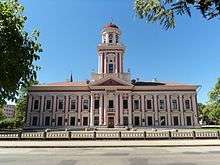Jelgava Gymnasium

Jelgava Gymnasium or Academia Petrina is the oldest higher educational establishment in Latvia.[1] Based on an idea by Friedrich Wilhelm von Raison, it was established in Mitau, capital of the Duchy of Courland and Semigallia, by Duke Peter von Biron in 1775. The duke wanted to attract professors like Immanuel Kant and Johan Gottfried Herder, but they refused.
After the partitions of the Polish–Lithuanian Commonwealth, Jelgava became part of the Russian Empire and the gymnasium unsuccessfully petitioned to become a university.[2] Nevertheless, it became an important cultural hub not only for Latvians, but also Lithuanians.[3] Many famous professors had lectured in Academia Petrina for example Johann Benjamin Koppe (1775), Johann August von Starck (1777-1781) and Wilhelm Gottlieb Friedrich Beitler (1775-1811).
During World War I, the school was evacuated to Taganrog in Rostov Oblast while its 42,000-volume library was burned by troops of Pavel Bermondt-Avalov.[4] During World War II, the historical school building was almost completely destroyed, therefore school was reestablished in new premises. The original building was later restored and now functions as the Ģederts Eliass Jelgava History and Art Museum.
Name
- 1775 Academia Petrina[5]
- Gymnasium Petrinum[6]
- since 1837: official name in German Gouvernements-Gymnasium
- 1934 to 1940: Hercoga Pētera ģimnāzija (Herzog-Peter-Gymnasium)[7]
- after 1945: Jelgavas 1. vidusskola (Jelgavan Secondary School Nr. 1)
- 15. August 1991: 1. Gymnasium
- 2012: Jelgavas Tehnoloģiju vidusskola (Technical Secondary School Jelgava)
History
The establishment of the academy was based on an idea by Friedrich Wilhelm von Raison: "But the whole province owes him excellent thanks for the effective part, which he took at the foundation of the Mitauian Gymnasium. He was actually the one who persuaded Duke Peter to do so; it was he who corresponded with Sulzern regarding the plan to be drawn up and because of the appointment of the first teachers and he who prescribed the books for the library and the instruments for the observatory; just as he also continuously participated in the perfection of the institute until his death". [8]
The intention was to establish a complete university with all four faculties in Mitau. This plan was rejected because of Kurland's dependence on Catholic-Polish rule. Under the law of Poland a university could not be founded without the consent and confirmation of the Pope, and it was unclear whether and when the permission by the papal curia to establish a Protestant theological faculty could have been obtained. Therefore, this intention was abandoned and it was decided to found an academic gymnasium which - half school, half university - should enjoy all the rights of a university, with the exception of the privilege of granting academic dignity. [9]
People
Famous students
| Name | Birth | Death | Later occupation |
|---|---|---|---|
| Jānis Čakste | 1859 | 1927 | President of Latvia |
| Alberts Kviesis | 1881 | 1944 | President of Latvia |
| Antanas Smetona | 1874 | 1944 | President of Lithuania |
| Stanisław Wojciechowski | 1869 | 1953 | President of Poland |
| Ernestas Galvanauskas | 1882 | 1967 | Prime minister of Lithuania |
| Mykolas Sleževičius | 1882 | 1939 | Prime minister of Lithuania |
| Krišjānis Barons | 1835 | 1923 | Latvian folklorist |
| Kārlis Mīlenbahs | 1853 | 1916 | Latvian philologist |
| Wincenty Lutosławski | 1863 | 1954 | Polish philosopher |
| Eduard Alexander von der Brüggen | 1822 | 1896 | Couronian field marshall |
| Ulrich von Schlippenbach | 1774 | 1826 | Baltic German poet |
Teachers
| Name | Birth | Death | Occupation at the school |
|---|---|---|---|
| Johann Melchior Beseke | 1746 | 1802 | Jurisprudence |
| Johann Benjamin Koppe | 1750 | 1791 | 1775, Greek language |
| Johann August von Starck | 1741 | 1816 | 1777–1781 |
| Wilhelm Gottlieb Friedrich Beitler | 1745 | 1811 | 1775–1811 mathematics |
| Johann Jacob Ferber | 1743 | 1790 | physics and natural history |
| Johann Georg Eisen von Schwarzenberg | 1717 | 1779 | 1776–1777 |
| Heinrich Friedrich Jäger | 1747 | 1811 | 1775–1789 |
| Johann Nicolaus Tiling | 1739 | 1798 | 1775–1798 |
| Johann Gabriel Schwemschuch | 1733 | 1803 | 1775–1798 |
| Matthias Friedrich Watson | 1733 | 1805 | |
| Johann Gottlieb von Groschke | 1760 | 1828 | natural history and chemistry |
| Johann Daniel von Braunschweig | 1786 | 1857 | 1817–1837 |
| Charles Toussaint | 1813 | 1877 | French |
| Magnus Georg Paucker | 1787 | 1855 | 1813–1855 mathematics und astronomy |
References
- ↑ Education, the Baltic States and the EU by Bryan T. Peck, page 89
- ↑ Estonian studies in the history and philosophy of science by R. A. Vikhalemm, page 52
- ↑ Lithuanian social democracy in perspective, 1893-1914by Leonas Sabaliūnas, page 98
- ↑ International dictionary of library histories, Volume 1 By David H. Stam, page 395
- ↑ http://d-nb.info/gnd/5218444-4
- ↑ 'Universitäten im östlichen Mitteleuropa: Zwischen Kirche, Staat und Nation', S. 43 https://books.google.com/books?isbn=3486845462
- ↑ http://d-nb.info/gnd/10108948-X
- ↑ Allgemeines Schriftsteller- und Gelehrten-Lexikon der Provinzen Livland, Esthland und Kurland, bearbeitet von Johann Friedrich von Recke, Karl Eduard Napiersky, Dritter Band, L-R, Mitau 1831, S. 461–463
- ↑ http://docplayer.org/44610177-Sitzungsberichte-jahresberichte-1935-1936-der-kurzemer-kurlaendischen-gesellschaft-fuer-literatur-und-kunst.html